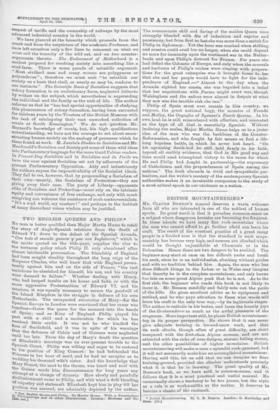TWO ENGLISH QUEENS AND PHILIP.*
No man is better qualified than Major Martin Hume to retell the story of Anglo-Spanish relations from the death of Edward VI. down to the defeat of the Spanish Armada. "Con todo el mundo guerra y pax con Inglaterra," which is the motto quoted on the title-page, supplies the clue to the tortuous policy which Philip II. only abandoned after ahnost intolerable provocation. The friendship of England had been sought steadily throughout the long reign of the Emperor Charles, who well knew that with England perma- nently against him and on the side of France, "the vast ambitions he cherished for himself, his son, and his country Were doomed to failure." Whether dealing with Henry, 'who had heaped insults on his house and faith, or with the More aggressive Protestantism of Edward VI. and his mentors, it was equally necessary to secure the goodwill of the Island Kingdom in the struggle in defence of his own Netherlands. The unexpected succession of Mary—for the Spanish Envoys in London were convinced that her cause was hopeless—threw the game for the moment into the bands of Spain; and as King of England Philip played his Part with a skill and a moderation for which be has received little credit. It was not he who kindled the fires of Smithfield, and it was in spite of his warnings that the defences of Calais and of Guisnes were neglected until too late. From the day of Mary's death the question of Elizabeth's marriage was an ever-present trouble to the Spanish Court. Philip was willing and eager to be restored to his position of King Consort : he had befriended the Princess in her hour of need, and lie had no scruples as to Wedding his deceased wife's sister. And the knowledge that Mary Stuart, the next to the throne, was heart and soul with the Guises made him discountenance for long years any attempt at a change of dynasty. How slowly and painfully disillusionment came to Philip, and with what a deft blending of coquetry and statecraft Elizabeth kept him in play till her Position was assured, are admirably depicted by the author.
Ragusa Q1106111 and Philip. By Martin Hume. Witth a 'ronfAspieco trusznottojrayqre and 12 other Illustrations. Londois: Idotluton and Co.
The consummate skill and daring of the maiden Queen were strangely blended with fits of indecision and caprice and parsimony, but from first to last she was more than a match for Philip in diplomacy. Yet the hour was reached when shifting and evasion could avail her no longer, when she could depend no more for immunity upon the continued war in the Nether- lands and upon Philip's distrust for France. For years she had defied the Colossus of Europe, and only when the arsenals and harbours of Philip's realms were ringing with prepara- tions for the great enterprise was it brought home to her that she and her people would have to fight for the inde- pendence of England :—" Almost to the day when the Armada sighted her coasts, she was beguiled into a belief that her negotiations with Parma might avert war, though Walsingham and the sailors were almost in despair at what they saw was the terrible risk she ran."
Philip of Spain must ever remain in this country, we suppose, the great national bogy, the monster of Fronde and Motley, the Orgoglio of Sponsor's Faerie Queene. In his own laud be is still remembered with affection, and venerated as the typo of all that is essentially .Spanish. Without inclining the scales, Major Martin Hume helps us to a juster idea of the man who was the backbone of the Counter- Reformation, and who fought by fair means or foul a life- long hopeless battle, in which he never lost heart. "On his agonising death-bed he still held firmly to his faith, beyond fill earthly evidence, that God in His good way and time would send triumphant victory to the cause for which He and Philip had fought in partnership—the supremacy of Catholicism and the preponderance of Spain among the nations." The book abounds in vivid and sympathetic por- traiture, and the writer's mastery of the contemporary Spanish authorities makes it an invaluable companion to the study of a most critical epoch in our existence as a nation.






















































 Previous page
Previous page